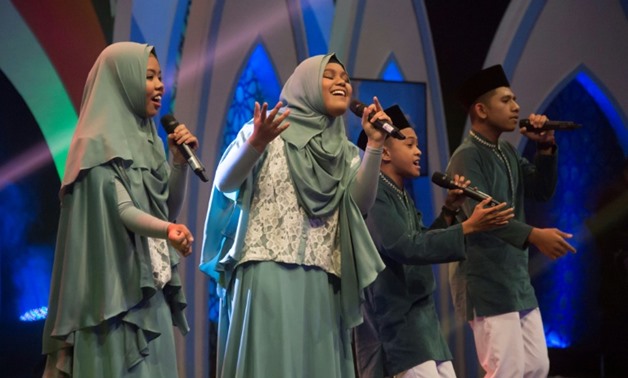
Syiar Anak Negeri (The Country's Children Preach) is one of a string of programmes played during Ramadan in Indonesia that feature kids as young as three competing for TV stardom-AFP/File / BAY ISMOYO
13 June 2018: It's a make or break moment for Indonesian high schooler Puteri Ara and her hijab-clad friends as they rap about religious tolerance to a cheering TV studio audience.
Can they beat a rival boy band singing about god's glory or the all-girl group calling on viewers to idolise the prophet Muhammad instead of Korean pop stars?
It's all up to the judges on Ramadan reality television -- a ratings bonanza watched by millions across the world's most populous Muslim-majority nation during the month-long fasting celebration.
"Muslims who are fasting have to be ready to stand with those who don't fast," belts out 16-year-old Ara.
"This is my country. It's built upon different religions but we're united in peace."
Part talent show and part sermon, the show Syiar Anak Negeri (The Country's Children Preach) is one of a string of similar programmes played during Ramadan that feature kids as young as three competing for TV stardom.
They compete for prizes including tickets to Islam's holiest city Mecca, cash of up to 100 million Rupiah (about $7,200) and university scholarships.
Ara's band has worked tirelessly on a set that meshes rap with beatbox and nasheed -- vocal music sung a cappella or backed by percussion instruments.
A celebrity-studded panel of judges, which also includes members of the religious affairs ministry and Indonesia's top Muslim cleric body, decides who goes on to the next round.
The show featuring Ara's group was the brainchild of producer Ferdi Setiawan, who wanted to help keep young people away from the clutches of drinking, drugs -- and radicalism.
"Through this programme we're hoping they'll develop a positive spirit and values," Setiawan said of the participants.
"And we're sure that when they return to their respective hometowns they'll become preachers at school, their neighbourhood or at least at home."
- 'Troubling preachers' -
Indonesia's reputation for religious tolerance was once again tested last month by a series of church bombings that killed a dozen Christian parishioners during Sunday services.
The country has long struggled with Islamist militancy, including the 2002 Bali bombings that killed over 200 people -- mostly foreign tourists -- in its worst-ever terror attack.
But the church killings by two suicide bomber families reignited fears about Indonesia's lurch toward religious conservatism, which has handed hardline groups unprecedented political power.
Spotting this shift, TV producers have tapped a growing demand for religion-inspired shows and marketed them to huge audiences during Ramadan, pushing once-dominant soap operas and prank TV shows to the sidelines.
But the renewed focus on religion has also opened the door to firebrand clerics who have taken to the airwaves to preach intolerance toward women, minority groups and non-Muslims.
"We've been seeing a lot of troubling preachers such as sexists and radicals," said Muhamad Heychael, an analyst at media monitor Remotivi.
They're not welcome on shows like The Country's Children Preach, however, and backers say the upbeat programmes could help push back against hardliners.
"This is a solution to counteract radicalism and increase tolerance," said Nanang Syaikhu, a lecturer in the communications department at Jakarta's State Islamic University.
Back in the studio, Ara's message of peace wasn't enough reach the next round.
Her group -- three girls and two boys -- were in tears at the loss, but they aren't giving up on the message.
"As the younger generation, we shouldn't divide people by saying 'Oh this person is a Muslim, this person is a non-Muslim' and constantly insult one another," Ara told AFP.
"We are different but we live in the same country," she added.
"Our differences will unite us."


Comments
Leave a Comment